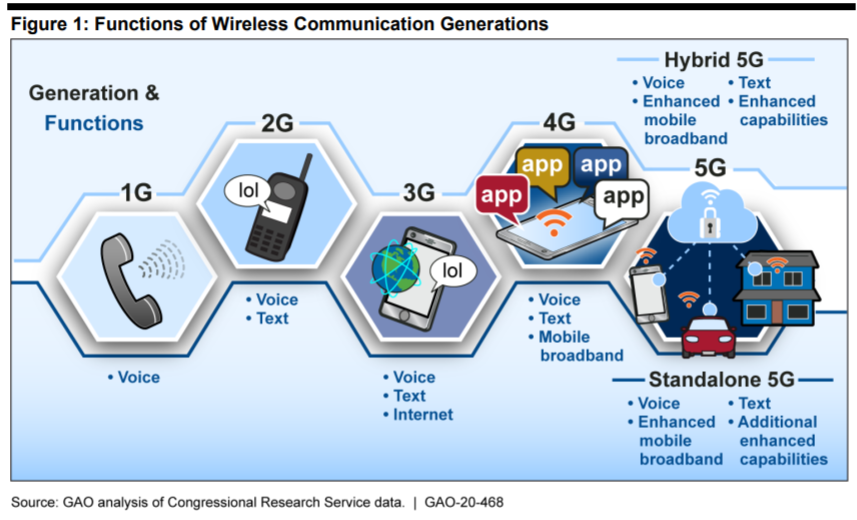GAO: FCC Needs More Metrics in 5G FAST Plan

The smarter way to stay on top of the multichannel video marketplace. Sign up below.
You are now subscribed
Your newsletter sign-up was successful
The General Accountability Office said the FCC's plan for managing the rollout of 5G has not laid out "specific and measurable performance goals" for either managing the spectrum demands of 5G or closing the digital divide, and it needs to.
That is the basic takeaway from a just-released report on 5G Deployment, whose title says it all from GAO's point of view: "FCC Needs Comprehensive Strategic Planning to Guide Its Efforts." It cites an FCC 5G planning document [the Facilitate America’s Superiority in 5G Technology Plan, or 5G FAST Plan," that it said lacks those needed metrics, without which the FCC "will be unable to determine the effectiveness of its spectrum management efforts, particularly related to the congested mid-band spectrum that is critical to 5G deployment."
Related: FCC Clarifies 5G Buildout Streamlining Strategy
It also said without such metrics, experts have said 5G deployment could widen the digital divide because it will be deployed initially, especially with the FCC's initial focus on high-band spectrum, is likely to be deployed in areas that already have the infrastructure, which are more urban, densely populated, and high-income, while those on the other side of the divide are mostly rural and low income.
The FCC counters that it needs to tailor those metrics to individual proceedings and circumstances rather than prejudging them, including getting input from federal agencies on band-specific proposals since they are often implicated by efforts to free up spectrum for commercial use.
The report, which was commissioned by members of Congress, looked at the challenge of allocating low-, mid- and high-band spectrum for 5G and how the FCC is approaching that challenge and the associated challenge of closing the digital divide. Both are increasingly important as the COVID-19 pandemic gets a second wind and the public is reliant on virtual connections to replace physical ones.
Related: 5G Is Here and For Real This Time
The smarter way to stay on top of the multichannel video marketplace. Sign up below.
The study was based on the input of experts, reviews of "relevant statutes, literature, and FCC documentation," according to GAO, as well as interviews with FCC and other federal officials and stakeholders including wireless carriers and industry associations.
The report noted both the importance of making more mid-band spectrum available and the challenge of doing so given that current users include federal agencies that "may not be able to readily transition to new or less favorable spectrum bands," though the FCC would argue that the challenge is also that federal agencies are reluctant to give up spectrum, ready or not, even if FCC engineering shows they can do so without sacrificing favorability.
GAO said the FCC needs to adopt those specific and measurable goals to "(1) manage spectrum demands for 5G and (2) determine the effects 5G deployment and any mitigating actions may have on the digital divide."
The FCC, which gets to respond to the findings, indicated that setting spectrum goals "could unnecessarily limit its options," but otherwise took no position on the recommendations," said GAO.
In its response to GAO, which came from the chiefs of the Wireless and Wireline Bureaus and the Office of Engineering and Technology, the FCC said that it does not want to prejudge issues by adopting performance goals before it reviews the record in individual proceedings, including economic and engineering studies.
"In other words," they said, "the commission adopts specific and measurable performance goals (with related strategies and measures) during ongoing rulemakings, once it becomes possible to establish such goals....Prejudging the engineering, economic, and other technical outcomes of a proceeding through unfounded or artificial benchmarks, as GAO recommends, could have the unintended consequences of limiting the options available to manage federal and non-federal spectrum demands," they said.
Contributing editor John Eggerton has been an editor and/or writer on media regulation, legislation and policy for over four decades, including covering the FCC, FTC, Congress, the major media trade associations, and the federal courts. In addition to Multichannel News and Broadcasting + Cable, his work has appeared in Radio World, TV Technology, TV Fax, This Week in Consumer Electronics, Variety and the Encyclopedia Britannica.

